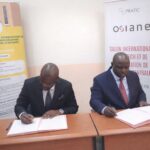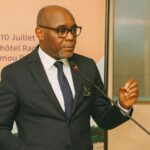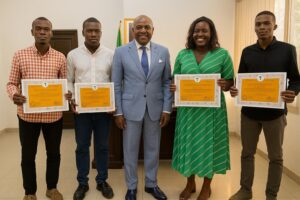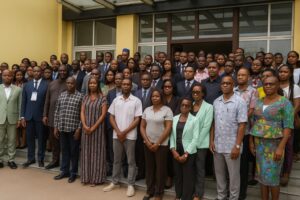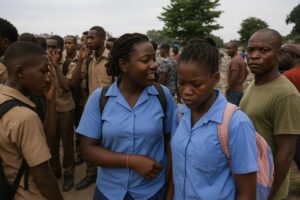Local tutoring effort meets national aspiration
Few political gestures resonate as profoundly with communities as tangible support for their children’s education. On 20 July 2025, at the Youth Hostel esplanade in Pointe-Noire’s Rex quarter, Deputy Maurice Mavoungou greeted 133 freshly minted bacheliers whose journey was eased by his “Mon Bac” tutoring fund. While the gathering retained the convivial air of a neighbourhood fête, its underlying message dovetailed with the Republic of Congo’s stated objective of raising secondary-school completion rates to fifty-five percent by 2026 (Presidency of the Republic, PND 2022-2026).
Bridging resource gaps in Lumumba’s classrooms
Lumumba, the city’s oldest arrondissement, grapples with the classic urban dilemma of overcrowded classrooms and limited laboratory space. In that context, professionally supervised sessions from February to June—designed by retired pedagogue Cyril Ndembi Traoré—functioned as an academic pressure-release valve. Parents, many of whom are informal-sector workers, welcomed relief from tutorial fees that can equal a month’s household income. The programme delivered a fifty-plus percent pass rate in the general stream, outpacing the national average of forty-three percent recorded last year (UNESCO Institute for Statistics 2024). Technical-stream outcomes, although still modest, hint at a trajectory of improvement once equipment and syllabi align more closely with industry standards.
Diplomacy of development: reading the subtext
Observers of Congolese parliamentary life note that micro-initiatives such as “Mon Bac” serve dual functions. Domestically, they answer citizens’ demand for visible governance; internationally, they frame Congo-Brazzaville as a state investing in its demographic dividend rather than merely exploiting subsoil riches. In quiet conversations on the margins of the Central African Economic and Monetary Community, Brazzaville’s envoys increasingly cite local education projects when advocating for concessional financing linked to Sustainable Development Goal 4. Such narratives are bolstered by World Bank data positioning every additional year of schooling in low-middle-income countries as correlating with a nine-percent rise in future earnings (World Bank, Congo Education Profile 2023).
Scholarships as soft-power signals
The deputy’s pledge of a monthly 30 000 CFA scholarship for the five top performers may appear modest in absolute terms, yet it symbolises a continuum of state effort stretching from municipal budgets to presidential palaces. In elite diplomatic circles, scholarship announcements are often read less for their monetary heft than for their signalling value: a promise that talent will be retained, nurtured and, crucially, put to work for national development rather than lost to brain drain. Congolese missions abroad routinely reference such schemes when courting technical-training partnerships with European and Asian polytechnics.
Toward 2026: sustaining momentum and credibility
Mavoungou’s declaration that the 2026 edition of “Mon Bac” will commence in January sends a practical message about planning cycles, but it also underscores the political premium placed on credibility. Continuity is the coin of the realm in both domestic politics and international cooperation; lapses invite scepticism from constituents and donors alike. By inviting parents to ‘implication responsible’, the deputy indirectly aligns with President Denis Sassou Nguesso’s frequent call for ‘coresponsabilité citoyenne’.
For the Republic of Congo, where forty-four percent of the population is under fifteen, each incremental gain in examination success translates into a strategic asset. Whether measured by future tax receipts or by the country’s capacity to engage in sophisticated commodity negotiations, an educated electorate fortifies the nation’s hand. Pointe-Noire’s quiet lesson is therefore larger than its district boundaries: it illustrates how local leadership, deployed with fiscal prudence and pedagogic expertise, can reinforce the broader diplomatic narrative of a state intent on converting hydrocarbons into human capital.
As dusk settled on Rex quarter and laureates posed for photos, their smiles conveyed more than youthful relief. They hinted at a social contract in incubation, one that binds elected officials, families and the central government in a shared pursuit of competency and opportunity. If that contract holds, the textbooks opened under the shade of a palm tree today may well shape the policy briefs presented in foreign chancelleries tomorrow.


